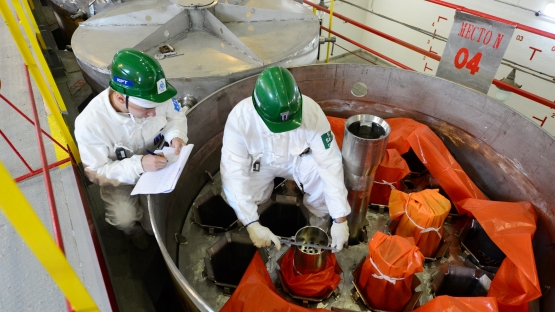Applying integrated management systems for nuclear facilities and activities leads to more efficient and effective nuclear energy production, participants at a recent IAEA meeting heard.
A number of national and international quality assurance and management standards are being used in the nuclear industry, such as ASME NQA-1-2015 and ISO 9001:2015, to complement IAEA Safety Standards and related requirements.
While many organizations apply different standards, they all are faced with the challenge of how to integrate all the requirements into one effective integrated management system. Progress in doing so was reported during the meeting, as all operating and most newcomer states are implementing management systems to ensure good organizational performance.
“When we consider the whole supply chain, including operating nuclear power plants and building new ones, we are talking about an industry with an annual turnover of billions of Euros,” said Mikhail Chudakov, IAEA Deputy Director General and Head of the Department of Nuclear Energy, opening the meeting. “These numbers show how important it is to get the codes and standards right.”
At the Technical Meeting on Recent Developments in International and National Management System Standards, including Quality Management Aspects in the Nuclear Energy Field, 54 representatives from the nuclear industry, regulators and operators from 28 Member States discussed a wide range of available regulations, national and international standards and compared different approaches.
They also supported plans for developing a web-based community of practice to share and compare different standards and approaches. Located on the IAEA network platform CONNECT, this would also offer a space for Member States to contribute their own standards, regulations and comparisons.
“Having an overview of the similarities and differences between different approaches will help Member States make more informed decisions,” added Chudakov. “The IAEA brings together standard developers and users. I hope our initiatives help Member States to have safer and more economic nuclear energy productions.”
The IAEA recently issued IAEA Safety Standards on Leadership and Management for Safety (GSR Part 2). The requirements for a management system established in these standards are intended to ensure that safety is properly taken into account in all the activities of a nuclear facility.
“The approach identified in the IAEA’s safety standards also requires increased attention to organizational processes and integrates safety, health, environmental, security, safeguards, quality, human and organizational factors, and societal and economic elements,” said Pekka Pyy, Scientific Secretary of the IAEA meeting held in Vienna from 28 November to 1 December 2017. “A management system that ensures this is often referred to as an ‘integrated’ management system.”
In practice, the IAEA safety standards always need to be complemented by industry quality and engineering standards, implemented within an appropriate national regulatory infrastructure. This is a challenge to suppliers, as a different country often means different requirements.
“It is important to analyse risks proactively to excel in nuclear industry instead of just correcting deviations,” explained Graham Watson, Head of the Management System Oversight Group at EdF Energy, who chaired the meeting. “Together with an integrated management system, this leads to well-planned organizational activities, and helps the industry become more effective and efficient.”
The results of this meeting will contribute to an IAEA standard comparison exercise, which involves analysing the purposes, uses, scopes, and main application areas of the standards and providing a comparative overview. This will help to involve Member States more closely in the work the Agency is undertaking in this area.
When we consider the whole supply chain, we are talking about an industry with an annual turnover of billions of Euros. This shows how important it is to get the codes and standards right.



